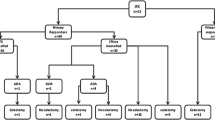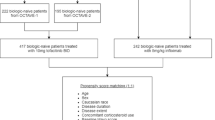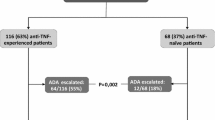Abstract
Background
The outcomes of infliximab dose escalation in ulcerative colitis (UC) have not been well evaluated.
Aims
To assess the short- and long-term outcomes of infliximab dose escalation in a cohort of patients with UC.
Methods
This was a multicenter, retrospective, cohort study. All consecutive UC patients who had lost response to infliximab maintenance infusions and who underwent infliximab dose escalation were included. Post-escalation short-term clinical response and remission were evaluated. In the long term, the cumulative probabilities of infliximab failure-free survival and colectomy-free survival were calculated. Predictors of short-term response and event-free survival were estimated using logistic regression analysis and Cox proportional hazard regression analysis.
Results
Seventy-nine patients were included. Fifty-four patients (68.4 %) achieved short-term clinical response and 41 patients (51.9 %) entered in clinical remission. After a median follow-up of 15 months [interquartile range (IQR) 8–26], 33 patients (41.8 %) had infliximab failure. Patients with short-term response had a significantly lower adjusted rate of infliximab failure [hazard ratio (HR) 0.24, 95 % confidence interval (CI) 0.12–0.49; p < 0.001]. During a median follow-up of 24 months (IQR 13–34), 9 patients (11.4 %) needed colectomy. Short-term response was identified as a predictor of colectomy avoidance (HR 0.14; 95 % CI 0.03–0.69; p < 0.007).
Conclusions
In UC patients who lost response to infliximab during maintenance, infliximab dose escalation enabled recovery of short-term response in nearly 70 % of patients. In the long term, 58 % of patients maintained sustained clinical benefit, and 9 of 10 avoided colectomy. Short-term response was associated with an 86 % reduction in the relative risk of colectomy.




Similar content being viewed by others
References
Rutgeerts P, Sandborn WJ, Feagan BG, et al. Infliximab for induction and maintenance therapy for ulcerative colitis. N Engl J Med. 2005;353:2462–2476.
Oussalah A, Evesque L, Laharie D, et al. A multicenter experience with infliximab for UC: outcomes and predictors of response, optimization, colectomy, and hospitalization. Am J Gastroenterol. 2010;105:2617–2625.
Rostholder E, Ahmed A, Cheifetz AS, et al. Outcomes after escalation of infliximab therapy in ambulatory patients with moderately active ulcerative colitis. Aliment Pharmacol Ther. 2012;35:562–567.
Reinisch W, Sandborn WJ, Rutgeerts P, et al. Long-term infliximab maintenance therapy for ulcerative colitis: the ACT-1 and -2 extension studies. Inflamm Bowel Dis. 2012;18:201–211.
Seow CH, Newman A, Irwin SP, et al. Trough serum infliximab: a predictive factor of clinical outcome for infliximab treatment in acute ulcerative colitis. Gut. 2010;59:49–54.
Arias MT, Vande Casteele N, Vermeire S, et al. A panel to predict long-term outcome of infliximab therapy for patients with ulcerative colitis. Clin Gastroenterol Hepatol. 2015;13:531–538.
Taxonera C, Olivares D, Mendoza JL, et al. Need for infliximab dose intensification in Crohn’s disease and ulcerative colitis. World J Gastroenterol. 2014;20:9170–9177.
Ma C, Huang V, Fedorak DK, Kroeker KI, et al. Outpatient ulcerative colitis primary anti-TNF responders receiving adalimumab or infliximab maintenance therapy have similar rates of secondary loss of response. J Clin Gastroenterol. 2014;. doi:10.1097/MCG.0000000000000265.
Yamada S, Yoshino T, Matsuura M, et al. Long-term efficacy of infliximab for refractory ulcerative colitis: results from a single center experience. BMC Gastroenterol. 2014;14:80. doi:10.1186/1471-230X-14-80.
Magro F, Rodrigues-Pinto E, Lopes S, et al. Earlier need of infliximab intensification in ulcerative colitis than in Crohn’s disease. J Crohns Colitis. 2014;8:1331–1332.
Silverberg MS, Satsangi J, Ahmad T, et al. Toward an integrated clinical, molecular and serological classification of inflammatory bowel disease: Report of a Working Party of the 2005 Montreal World Congress of Gastroenterology. Can J Gastroenterol. 2005;19:35–36.
Gisbert JP, Panés J. Loss of response and requirement of infliximab dose intensification in Crohn’s disease: a review. Am J Gastroenterol. 2009;104:760–767.
Rutgeerts P, Feagan BG, Lichtenstein GR, et al. Comparison of scheduled and episodic treatment strategies of infliximab in Crohn’s disease. Gastroenterology. 2004;126:402–413.
Cesarini M, Katsanos K, Papamichael K, et al. Dose optimization is effective in ulcerative colitis patients losing response to infliximab: a collaborative multicentre retrospective study. Dig Liver Dis. 2014;46:135–139.
Katz L, Gisbert JP, Manogian B, et al. Doubling the infliximab dose versus halving the infusion intervals in Crohn’s disease patients with loss of response. Inflamm Bowel Dis. 2012;18:2026–2033.
Filippi J, Allen PB, Hébuterne X, et al. Does anti-TNF therapy reduce the requirement for surgery in ulcerative colitis? A systematic review. Curr Drug Targets. 2011;12:1440–1447.
Sandborn WJ, Rutgeerts P, Feagan BG, et al. Colectomy rate comparison after treatment of ulcerative colitis with placebo or infliximab. Gastroenterology. 2009;137:1250–1260.
Panaccione R, Ghosh S, Middleton S, et al. Combination therapy with infliximab and azathioprine is superior to monotherapy with either agent in ulcerative colitis. Gastroenterology. 2014;146:392–400.
Ferrante M, Vermiere S, Fidder H, et al. Long-term outcome after infliximab for refractory ulcerative colitis. J Crohn’s Colitis. 2008;2:219–225.
Sandborn WJ, van Assche G, Reinisch W, et al. Adalimumab induces and maintains clinical remission in patients with moderate-to-severe ulcerative colitis. Gastroenterology. 2012;142:257–265.
Sandborn WJ, Feagan BG, Marano C, et al. Subcutaneous golimumab maintains clinical response in patients with moderate-to-severe ulcerative colitis. Gastroenterology. 2013;146:96–109.
Feagan BG, Rutgeerts P, Sands BE, et al. Vedolizumab as induction and maintenance therapy for ulcerative colitis. N Engl J Med. 2013;369:699–710.
D’Haens GR, Panaccione R, Higgins PD, et al. The London Position Statement of the World Congress of Gastroenterology on Biological Therapy for IBD with the European Crohn’s and Colitis Organization: when to start, when to stop, which drug to choose, and how to predict response? Am J Gastroenterol. 2011;106:199–212.
Allez M, Karmiris K, Louis E, et al. Report of the ECCO pathogenesis workshop on anti-TNF therapy failures in inflammatory bowel diseases: definitions, frequency and pharmacological aspects. J Crohn’s Colitis. 2010;4:355–366.
Taxonera C, Estellés J, Fernández-Blanco I, et al. Adalimumab induction and maintenance therapy for patients with ulcerative colitis previously treated with infliximab. Aliment Pharmacol Ther. 2011;33:340–348.
Huang VW, Prosser C, Kroeker KI, Wang H, et al. Knowledge of fecal calprotectin and infliximab trough levels alters clinical decision-making for IBD outpatients on maintenance infliximab therapy. Inflamm Bowel Dis. 2015;21:1359–1367.
Paul S, Del Tedesco E, Marotte H, et al. Therapeutic drug monitoring of infliximab and mucosal healing in inflammatory bowel disease: a prospective study. Inflamm Bowel Dis. 2013;19:2568–2576.
Steenholdt C, Enevold C, Ainsworth MA, et al. Genetic polymorphisms of tumour necrosis factor receptor superfamily 1b and fas ligand are associated with clinical efficacy and/or acute severe infusion reactions to infliximab in Crohn’s disease. Aliment Pharmacol Ther. 2012;36:650–659.
Medrano LM, Taxonera C, Márquez A, et al. Role of TNFRSF1B polymorphisms in the response of Crohn’s disease patients to infliximab. Hum Immunol. 2014;75:71–75.
Acknowledgments
The authors would like to thank Dr. C. Fernandez for her assistance in the statistical analysis and Dr. G. Morley for writing support and for reviewing the English manuscript.
Conflict of interest
C.T., M.B., M.C., C.S., G.B., M.D.M., J.P.G., V.G., I.M., F.B., M.Ch., M.P.M., J.L.M., and I.F. have served as a speaker and consultant for MSD and AbbVie. M.Ch. has received research funding from MSD and AbbVie. The remaining authors declare that they have nothing to disclose. Writing support was provided by G. Morley and funded by MSD of Spain.
Author information
Authors and Affiliations
Corresponding author
Rights and permissions
About this article
Cite this article
Taxonera, C., Barreiro-de Acosta, M., Calvo, M. et al. Infliximab Dose Escalation as an Effective Strategy for Managing Secondary Loss of Response in Ulcerative Colitis. Dig Dis Sci 60, 3075–3084 (2015). https://doi.org/10.1007/s10620-015-3735-4
Received:
Accepted:
Published:
Issue Date:
DOI: https://doi.org/10.1007/s10620-015-3735-4




